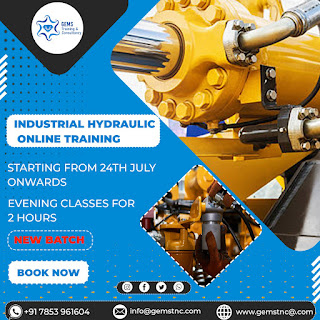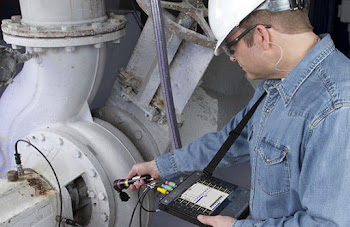HYDRAULIC TRAINING
ABOUT THE TRAINING:
Industrial hydraulic training provides participants with essential
knowledge and skills related to hydraulic systems used in various industries.
It covers system components, operation principles, maintenance,
troubleshooting, and safety. This training helps professionals enhance their
expertise, improve system performance, and increase productivity. Gain a
competitive edge in the industry with industrial hydraulic training.
OUR TRAINING INCLUDES:
1. BASICS OF HYDRAULICS:
The basis for all hydraulic systems is expressed by Pascal's law which states that the pressure exerted anywhere upon an enclosed liquid is transmitted undiminished, in all directions, to the interior of the container. This principle allows large forces to be generated with relatively little effort. As illustrated, a 5-pound force exerted against a 1-inch square area creates an internal pressure of 5 psi. This pressure, acting against the 10 square inch area develops 50 pounds of force.
2HYDRAULIC COMPONENTS UNDERSTANDING:
The major components that make up a hydraulic system are the reservoir, pump, valve(s) and actuator(s) (motor, cylinder, etc.).
HYDRAULIC RESERVOIR:
Hydraulic
reservoirs are storage tanks that hold liquids or gases used in fluid power
applications. They are usually: rectangular. cylindrical. T-shaped.
The
main function of a reservoir is to hold system hydraulic fluid in a convenient
location for the pump inlet. In addition to system requirements, the reservoir
also holds excess fluid needed when the hydraulic system is in operation.
4. HYDRAULIC PUMPS:
Hydraulic
pumps generate power by converting the mechanical power into hydraulic energy
power. It generates flow with enough power and hence creating to overcome
pressure exerted on it.
5HYDRAULIC CYLINDERS:
Hydraulic cylinder is a hydraulic actuator that provides the
linear motion when hydraulic energy is converted to mechanical energy.
HYDRAULIC MOTORS:
Hydraulic Motors convert fluid motion into rotary cycle motion. We use these motors to leverage the machineries to execute the efficiency.
HYDRAULIC CONTROL VALVE:
Hydraulic flow control valves are used to regulate speed
within a specific part of the hydraulic system to ensure optimum performance at
all times. By maintaining the flow rate and pressure of the fluid, they
directly regulate the speed of motors and cylinders.
DIRECTIONAL CONTROL VALVES:
It is used in
pneumatic systems to direct or stop the flow of the compressed air.
Directional control valves are used in pneumatic systems to direct or stop the flow of compressed air or oil to their appliances. They are probably the most used elements in pneumatic systems and can be used for example to actuate a cylinder, a larger industrial valve, or air tools.
FLOW CONTROL VALVES:
Flow control valves are the operators which provides you the the
control purposes use.
HYDRAULIC FILTERS AND ACCESSORIES:
Basic hydraulic filter components _ sediment filter, pre
filter, post filter. It is a protected component within a hydraulic system that
removes damaging a porous filter element.
HYDRAULIC OILS AND PROPERTIES:
These
are the non - compressible and thermally stable within a range of operating
temperature. Fire resistance and non corrosive.Low tendency captivation.
HYDRAULIC CIRCUIT DESIGN:
A hydraulic circuit is a group of components such as pumps, actuator, control valves, coductors conductors and fittings arranged to perform useful work.
Hydraulic Training
·
Maintenance and troubleshooting of hydraulic system will
become systematic.
·
There will be drastic reduction in the trouble hours, in a
way improve productivity.
·
Reduces maintenance cost.
·
Machine reliability will increase.
·
Reduces cost of consumables.
·
Reduces inventory cost.
· Effective life of equipment increases.
EXAMINATION DETAILS:
We
conduct an online exam after the completion of the training. The duration for
exam is 45 minutes and the questions are multiple choice type.
Candidates who have successfully completed their training are eligible for certification after the completion of the training program.
FEE STRUCTURE:
Our
Industrial Training Program costs INR 5,000/ USD 65 for the enrollment in the course. The amount
you need to pay for the complete course can be paid before the date mentioned
above.
Note:
We have limited seats available grab your seat before sold out.

.jpeg)

Comments
Post a Comment